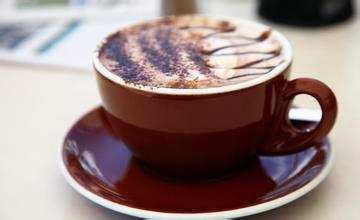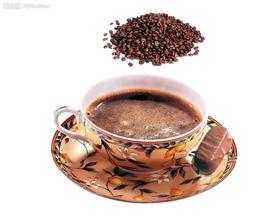Introduction of boutique coffee with rich aroma and lubricated taste in Uganda Coffee Manor
China Coffee Network
Java (Java), refers to Java Island, belongs to Indonesia, is the country's fourth largest island, the capital Jakarta is located in Java Island northwest coast. Java is also the name of a computer language that is known for its Java coffee, and its icon for steaming Java coffee.
Java coffee beans early years of Java coffee fame, here refers to the former Java produced Arabica coffee. It has a rich aroma, low acidity, smooth taste, and with mocha coffee, the result is "Java mocha blend coffee" once popular, synonymous with top coffee, fame spread.
Java coffee sold to Europe at that time was a very special coffee. Because it was shipped to European and American countries by sailboat at that time, the journey was long and the speed was slow, so it took a lot of time on the way. Coffee in this case, as if after a special fermentation, taste very unique.
Later, when ships replaced sailboats, people drank fresher coffee beans because of shorter delivery times. But people accustomed to old beans are not used to this fresh taste, so they desperately pursue old Java coffee, so that the Indonesian government and some businessmen deliberately store fresh beans in warehouses for one to two years before selling them to consumers. In fact, the acidity of aged Java beans is reduced to nearly zero compared to fresh beans, while the aroma is more intense. Because of the long storage time, the cost increases a lot, and the quantity is limited, so aged Java has always been a hot commodity in the coffee market. In the 1880s, some traders deliberately tampered with fresh Guatemala or Venezuela beans to copy old Java and sell them at high prices. What is intolerable is that 0 traders dye coffee beans in a way that makes them look more like aged java, but there is no doubt that the dyeing chemicals are poisonous.
Java produces only a small number of arabica beans, most of which are Romstar beans imported from Africa after the rust disaster. The roasted coffee has a bitter taste but an extremely light aroma. Although it has a low acidity and a delicate taste, it is rarely used as a drink, often used as a blend coffee or to make instant coffee. Uganda is the original country of Robusta coffee, but commercial cultivation of Arabica did not begin here until the early 1900s. Today Uganda still has a large number of wild Robusta coffee trees, which are rare in cities around the world. As a landlocked country, Uganda's large coffee cultivation is often interplanted, where coffee trees are mixed with food crops and rubber trees. Because of the unique natural environment, coffee flowers here twice a year on average, which makes Uganda the world's largest coffee honey producer. In order to improve coffee quality and reduce costs, Uganda abolished the exclusive management rights of the Coffee Marketing Board (CMB) in November 1990. Most of the work previously undertaken by the Coffee Marketing Committee has now been transferred to cooperative organizations. Privatized coffee generates two-thirds of the country's export revenue, so the government imposed a tax on coffee in the hope of raising much-needed revenue. This has led to a 20% drop in coffee exports and an increase in coffee smuggling.
As in Tanzania, where rising coffee prices in recent years have encouraged farmers to return to plantations and reclaim once-abandoned land for coffee, Uganda's coffee industry looks promising

Important Notice :
前街咖啡 FrontStreet Coffee has moved to new addredd:
FrontStreet Coffee Address: 315,Donghua East Road,GuangZhou
Tel:020 38364473
- Prev

Burundian coffee boutique coffee bean manor with strong aroma and excellent acidity
There are different flavors of coffee, so you can't drink three or four cups in a row like tea or cola, but the formal coffee cup is the best. The average amount of coffee to drink is 80-100cc. Sometimes if you want to drink three or four cups in a row, you have to dilute the concentration of coffee, or add a lot of milk, but you still have to consider the degree of physical needs to add or decrease coffee.
- Next

Introduction to the producing area of high-quality coffee beans in Ecuador coffee manor with balanced acidity
The Republic of Ecuador is located in northwestern South America. It is bordered by Colombia in the northeast, Peru in the southeast and the Pacific Ocean in the west. It covers an area of 256370 square kilometers and the coastline is about 930km long. The equator runs north of the border, and Ecuador means the Spanish equator, which means Guayaquil is Ecuador's largest seaport. It faces the Pacific Ocean and backs against Mount Santa Ana. There is Pune Island nearby.
Related
- Detailed explanation of Jadeite planting Land in Panamanian Jadeite Manor introduction to the grading system of Jadeite competitive bidding, Red bid, Green bid and Rose Summer
- Story of Coffee planting in Brenka region of Costa Rica Stonehenge Manor anaerobic heavy honey treatment of flavor mouth
- What's on the barrel of Blue Mountain Coffee beans?
- Can American coffee also pull flowers? How to use hot American style to pull out a good-looking pattern?
- Can you make a cold extract with coffee beans? What is the right proportion for cold-extracted coffee formula?
- Indonesian PWN Gold Mandrine Coffee Origin Features Flavor How to Chong? Mandolin coffee is American.
- A brief introduction to the flavor characteristics of Brazilian yellow bourbon coffee beans
- What is the effect of different water quality on the flavor of cold-extracted coffee? What kind of water is best for brewing coffee?
- Why do you think of Rose Summer whenever you mention Panamanian coffee?
- Introduction to the characteristics of authentic blue mountain coffee bean producing areas? What is the CIB Coffee Authority in Jamaica?

